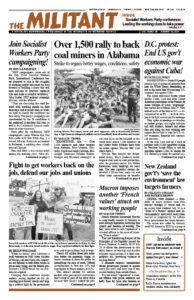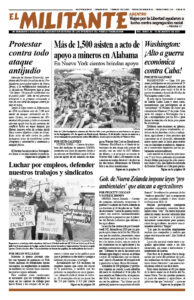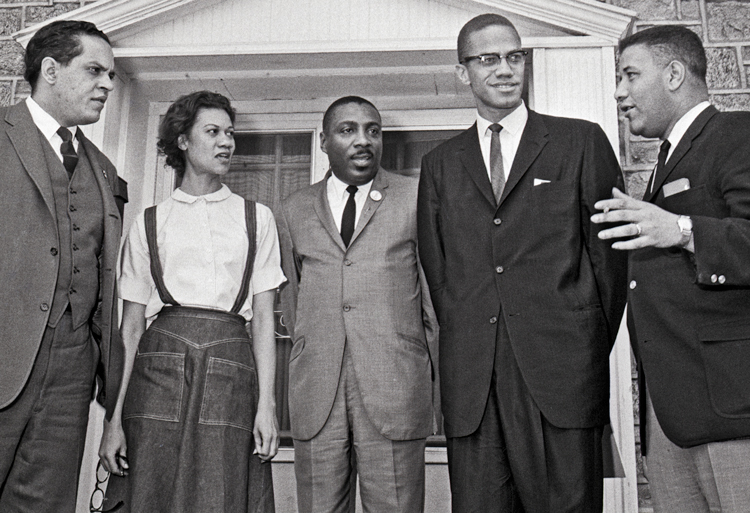Gloria Richardson, a leader in the fight for Black rights in the U.S., died July 15. She was 99.
As head of the Cambridge Nonviolent Action Committee in Cambridge, Maryland, an affiliate of the Student Nonviolent Coordinating Committee, she led militant demonstrations that won victories against segregation in housing, schools, and public accommodations and for jobs, despite attacks by white-supremacist thugs and a National Guard occupation, as well as public rebuke from conservative Black leaders.
She publicly solidarized with Malcolm X’s call for the right of self-defense against racist terror. Her admiration for Malcolm led them to collaborate closely during the last year of his life in advancing independent working-class political action, including promoting a national Freedom Now Party, to counter the Democrats and Republicans.
In July 1963, as National Guardsmen were preparing to charge a crowd of Black protesters, Richardson rushed to address the demonstrators. She shoved aside a bayoneted rifle that a Guardsman was pointing at her and walked through, followed by a well-organized defense unit led by young Black men.
Later that month, Maryland and federal authorities, led by Attorney General Robert F. Kennedy, drafted a plan to desegregate public facilities that required passage in a referendum vote in Cambridge.
Richardson led the CNAC in organizing Black residents not to participate in this referendum. “Why would we agree to submit to have our civil rights granted by vote when they were ours already, according to the Constitution,” Richardson told the media.
At the Aug. 28, 1963, March on Washington for Jobs and Freedom, Richardson was chosen to be honored as one of six women “freedom fighters.” But organizers, who fought to water down the speech of Student Nonviolent Coordinating Committee leader John Lewis, had no intention of letting Richardson express her point of view either. When she rose to speak, after saying “Hello” her mic was cut off.
Richardson led CNAC to pay special attention to organizing workers and taking on segregation in the unions. They got involved in successful organizing drives led by the United Packinghouse Workers union. She described how Caucasian workers in the union wanted to learn more about the desegregation fight, and both Black and Caucasian workers welcomed CNAC’s militant backing. “Black and white people both needed more money and needed a union rather than fighting for the other’s job,” she said in a 1994 interview.
Black unemployment in Cambridge was about 30% in 1961. In response to CNAC’s demands for jobs and equal pay, Black and Caucasian workers from the Rob Roy garment factory invited Richardson to a meeting of their local union, the International Ladies’ Garment Workers Union, to discuss how to fight the wage differences between what they got and the higher pay union officials had gotten for garment workers in New York. The workers prevented ILGWU officials there from ejecting Richardson from the meeting.
Collaboration with Malcolm X
In the first week of November 1963 Richardson attended a meeting of the Northern Negro Leadership Conference in Detroit. But she found the workshops disappointing for not focusing on building a mass movement to address the needs of Black working people. Organizers had refused to allow any discussion on building the Freedom Now Party, so a separate Grass Roots conference was set up simultaneously there.
Upon hearing Malcolm X would be speaking at the windup rally at the Northern Grass Roots Leadership Conference, she decided to go. She received a standing ovation. While she was familiar with Malcolm, this was the first time they met.
In his “Message to the Grass Roots” speech, Malcolm said, “Local Negro leaders began to stir up the masses. In Cambridge, Maryland, Gloria Richardson; in Danville, Virginia, and other parts of the country, local leaders began to stir up our people at the grass-roots level.”
Richardson spoke next. The Grass Roots conference unanimously adopted a resolution to support the Freedom Now Party and to support the principle of self-defense.
Afro-American journalist William Worthy interviewed Richardson March 8, 1964, saying that she was “the first civil rights leader to accept an offer of cooperation from” Malcolm X. That was also the day that Malcolm broke from the Nation of Islam.
The following week Richardson invited Malcolm to give the keynote speech at a conference she was helping organize in Chester, Pennsylvania, hosted by the Freedom Now Committee there. The conference was covered by the Militant, which reported it formed a new civil rights organization called “ACT,” which advocated building an independent Freedom Now Party.
When Malcolm X formed the Organization for Afro-American Unity in June 1964, Richardson accepted his invitation to join. The possibility of their further collaboration was cut short after Malcolm was assassinated Feb. 21, 1965.
Richardson later pulled back from active involvement in leading the fight for Black rights. But she never backed off her views.


